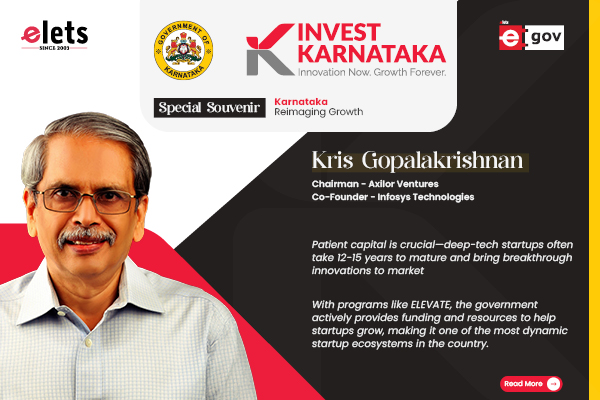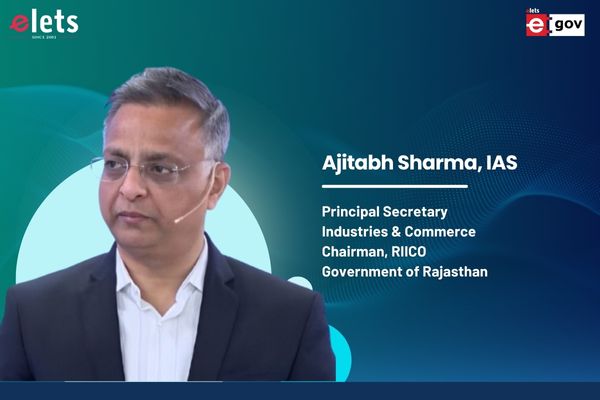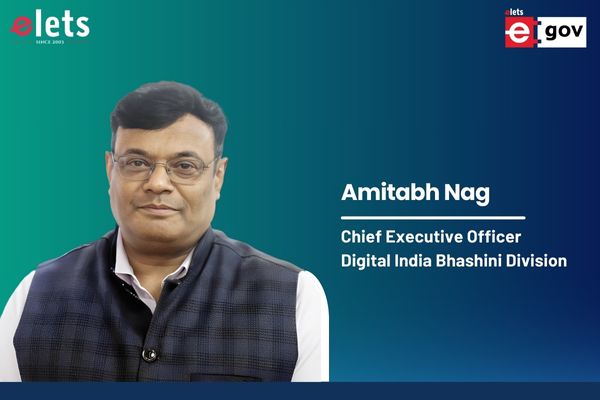
Karnataka has emerged as a hub for technology, innovation, and startups, driven by strong public-private partnerships, proactive government policies, and a dynamic ecosystem. With initiatives like the Karnataka Digital Economy Mission (KDEM) and programs like ELEVATE, the state has been at the forefront of encouraging entrepreneurship and attracting investments. As India undergoes an AI-driven transformation, deep-tech startups are reshaping industries like healthcare, logistics, e-commerce, and fintech, while the IT sector continues to evolve with global expertise and resilience. Kris Gopalakrishnan, Chairman, Axilor Ventures and Co-Founder, Infosys Technologies, shared his insights on Karnataka’s evolving tech landscape, the future of India’s IT industry, and the challenges and opportunities in scaling deep-tech ventures, in an exclusive interaction with Elets News Network (ENN). Edited excerpts:
You have witnessed the transformation and development of Karnataka’s various ecosystems over the years. What key changes have made the state’s ecosystem more favourable for investors?

Karnataka’s transformation into a preferred investment state has been driven by a strong collaborative approach between the government and industry. Successive governments have encouraged a public-private partnership model, ensuring that businesses and policymakers work together to shape the state’s growth. A key initiative in this journey is the Karnataka Digital Economy Mission (KDEM), a unique PPP model that goes beyond Bengaluru to drive development across different regions of the state, creating opportunities in emerging hubs. The state has also been a frontrunner in supporting startups and innovation. With programs like ELEVATE, the government actively provides funding and resources to help startups grow, making it one of the most dynamic startup ecosystems in the country.

As the Chair of the Vision Group on Information Technology (VGITE), what role is the group playing in driving Karnataka’s startup and innovation ecosystem?

Our role is to bridge the gap between the government and the industry to ensure that Karnataka remains a leader in technology, startups, and innovation. We work closely with the government to provide insights and recommendations, ensuring that policies are crafted in consultation with industry stakeholders to create a supportive environment for IT companies to thrive.

Also Read | Invest Karnataka 2025: Driving Innovation and Growth
A key initiative in this journey is the Bengaluru Tech Summit (BTS)—a flagship event that brings together leaders from IT, biotechnology, startups, and related industries. Managed by the government, BTS serves as a platform for collaboration, knowledge sharing, and discussions that shape the future of these sectors in Karnataka and beyond.
Through Axilor Ventures, you’ve been instrumental in nurturing deep-tech startups. Could you share insights into the specific technologies or sectors you are most excited about, and how these startups might shape India’s technological landscape in the coming years?
At Axilor Ventures, we are deeply invested in nurturing deep-tech startups that have the potential to transform industries. Among the many emerging technologies, Artificial Intelligence (AI) stands out as the most exciting and impactful. AI is no longer a niche technology—it is becoming a core driver of innovation across sectors, enabling businesses and startups to enhance their products, improve efficiency, and unlock new possibilities.
We see immense opportunities in sectors like healthcare, logistics, e-commerce, and fintech, where AI is reshaping the way businesses operate. From AI-driven diagnostics in healthcare to smart supply chain solutions in logistics; from personalised shopping experiences in e-commerce to risk assessment and fraud detection in fintech, the impact of AI is far-reaching. As these startups grow and scale, they will play a pivotal role in shaping India’s technological landscape, making it more competitive, efficient, and globally relevant.
With India witnessing a surge in deep-tech and AI-driven startups, what key challenges do you see in scaling these ventures? How can industry leaders and policymakers collaborate to create a more conducive ecosystem for innovation?
While India is witnessing a surge in deep-tech and AI-driven startups, scaling these ventures comes with its own set of challenges. One of the biggest gaps is the availability of deep-tech-focused venture capital (VC) funds. Unlike traditional startups, deep-tech ventures require longer gestation periods and higher R&D investments, making it essential to have patient and sustained funding.
Another key challenge is the need for more domestic capital, especially in the later stages of startup growth. While early-stage funding has improved, many promising startups struggle to secure the capital required to scale beyond a certain point.
Additionally, patient capital is crucial—deep-tech startups often take 12-15 years to mature and bring breakthrough innovations to market. Unlike conventional businesses, they need long-term financial backing to navigate research, development, and commercialisation.
To bridge these gaps, philanthropic grants can play a transformative role, helping startups survive the “valley of death”—a critical phase where they may not yet be eligible for VC funding but require support for product trials, regulatory approvals, and market validation. This is particularly important for health-tech startups, where extensive testing and compliance procedures are required before reaching commercialization.
Also Read | Karnataka’s Vision for Industrial Growth and Startup Innovation
For India to build a truly world-class deep-tech ecosystem, industry leaders and policymakers must collaborate to create a more conducive environment—one that fosters long-term investments, encourages domestic capital participation, and provides strategic funding support to promising ventures at different stages of their journey.
Reflecting on your journey with Infosys and your subsequent ventures, what is your vision for the future of India’s IT industry? What steps should be taken to ensure its continued growth and global leadership?
Over the decades, the IT industry has built global expertise, financial strength, and a loyal customer base. It has weathered multiple disruptions and emerged stronger each time, reinforcing its position as a world-class technology powerhouse. To ensure continued growth and global leadership, government support and strategic policy interventions will be crucial. The industry operates in an intensely competitive global landscape, and policies that promote innovation, ease of doing business, and talent development will help sustain its leadership position.
Additionally, as the industry undergoes a major AI-driven transformation, a key focus must be on reskilling the workforce. Both industry and government must work together to equip employees with new AI-driven skills and tools, ensuring a smooth transition into the future of technology. By encouraging continuous learning and adaptability, India can maintain its competitive edge and leadership in the global IT landscape.
Be a part of Elets Collaborative Initiatives. Join Us for Upcoming Events and explore business opportunities. Like us on Facebook , connect with us on LinkedIn and follow us on Twitter, Instagram.
"Exciting news! Elets technomedia is now on WhatsApp Channels Subscribe today by clicking the link and stay updated with the latest insights!" Click here!













